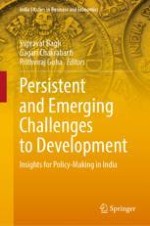2022 | OriginalPaper | Chapter
3. Informal Sector in India: A Critique of Inclusive Transition
Authors : Anirban Kundu, Saumya Chakrabarti
Published in: Persistent and Emerging Challenges to Development
Publisher: Springer Nature Singapore
Activate our intelligent search to find suitable subject content or patents.
Select sections of text to find matching patents with Artificial Intelligence. powered by
Select sections of text to find additional relevant content using AI-assisted search. powered by
